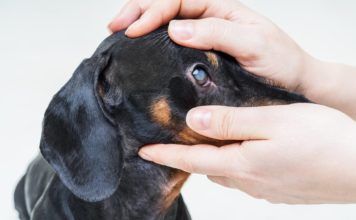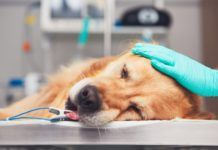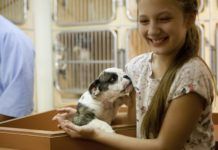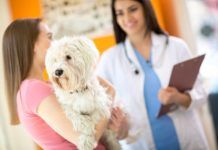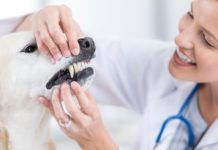Dog Anesthesia: 5 Questions to Ask Your Vet
Advances in dog anesthesia techniques have made veterinary surgery considerably safer nowadays, but its usage needs to be tailored to the individual dog to make it as risk-free as possible. Here are the important questions to ask before your dog undergoes surgery.
Help for the Overweight Dog
Obesity in dogs is a problem that veterinarians are seeing increasingly in recent years. In fact, obesity is considered the most common preventable disease in dogs in North America. Approximately one in four dogs is considered obese, with 50 percent weighing more than they should.
Looking for Puppies for Adoption?
Simply put, its nearly impossible to resist the cuteness of a puppy. Some people prefer the idea of training a young puppy with the hopes of creating the adult dog of their dreams. But what are the things to anticipate when planning to adopt?
How to Make Vet Visits for Dogs Less Scary for Them
Taking your dog to the vet on a regular basis is one of the most important things you can do as a responsible owner. If your dog is scared of the vet - or worse, if your dog is terrified of the vet - youre not alone. This is a big reason why some owners put off or avoid altogether the recommended wellness checks.
How to Get Rid of Fleas For Good
Its an-all-too common question from pet owners: Whats the best flea treatment for my home? A research study discovered that in the average flea-infested house, the adult fleas represent only about one to five percent of the flea population! So where are the rest of the pests, you may ask? Flea eggs make up about 50 to nearly 60 percent, flea larvae makes up about 35 percent, and the pupae (a life stage of the flea that comes after larvae and before emergence as an adult) about 10 percent.
Why Brushing Your Dogs Teeth is So Important
For us, daily tooth care and regular dental visits are basic things that we do to stay healthy. But did you realize that our pets require regular dental care, too? Truly bad dog breath (not normal doggy breath) is one of the most commonly ignored problems in our dogs - and a sure sign of canine dental and gum disease.
Canine Medicine: Respiratory Ailments
A dog's first respiratory system line of defense is in the nasal cavity, where microscopic hairs (cilia) bathed in mucus trap particles. If inhaled particles penetrate to the lungs, macrophages (large cells whose name means "big eaters") ingest the invaders. If these defense mechanisms fail, a dog can develop respiratory problems. The most common diseases of the upper respiratory tract (the airways from the nost to the bronchi) are kennel cough (infectious tracheobronchitis) and chronic bronchitis.…
Canine Medicine: Deworming
Your dog's body is a smorgasbord for flies, ticks, fleas, mosquitoes, and countless other parasitic invaders, perhaps the most insidious of which rely on your dog's intestinal tract for the completion of their life cycles. Not surprisingly, our contemplation of these often microscopic lives is limited to how best to eradicate them.
"Internal and external parasites are of concern to every dog and cat I see," says Dr. Michael Stone, veterinary internist and clinical assistant professor of Tufts University School of Veterinary Medicine. "I feel it is my responsibility to discuss parasitic infections and their consequences. Many owners are not aware of the dangers that exist for both their pet and themselves."
Canine Medicine: Skin Problems
The Itch All dogs scratch periodically (and often follow with a good shake) to clean themselves and stimulate their skin glands. But dogs also scratch in response to an itch - an irritating, localized skin sensation transmitted to the brain. "Excessive scratching or licking is a sing that your dog's itch has pathological (disease-related) origins," says Dr. Laurie Stewart, a dermatologist at Veterinary Dermatology of New England in Westford, Massachusetts. …
Dog Care & Nutrition Tip#2 Preventing “Lost Dog”
We go to great lengths to ensure our dogs' safety. We leash them, fence them, keep them indoors or close to our sides. Yet accidents happen. A door doesn't close tightly. The meter reader leaves the gate open. A section of fence falls down in a windstorm, flood, or earthquake. We're in a car accident and our dog panics, jumps through the broken windshield, and runs off.
Dog Care & Nutrition: Dog Injuries
When your dog is hurt, you have no time to lose. Your pet needs attention. Now. Considering the many scrapes and tussles a typical dog will endure in a long, eventful lifetime, it's good to know that you safely can handle some of his or her health problems by at home. But which ones? And how? And which situations definitely require a veterinarian's immediate attention?
Dog Care & Nutrition: Aging Dogs
Keeping Your Dog Engaged
Owners can take greater responsibilities in helping slow the aging process by noting early changes in their dogs' appetites, behaviors and physical conditions. Veterinarians offer these recommendations:
Reinforce basic commands. You can teach an aging dog to "Sit" before heading out the door for a walk or "Give me a paw" shake before settling down his or her food bowl. Test hearing and sight by teaching your dog to make eye contact with…
Owners can take greater responsibilities in helping slow the aging process by noting early changes in their dogs' appetites, behaviors and physical conditions. Veterinarians offer these recommendations:
Reinforce basic commands. You can teach an aging dog to "Sit" before heading out the door for a walk or "Give me a paw" shake before settling down his or her food bowl. Test hearing and sight by teaching your dog to make eye contact with…



